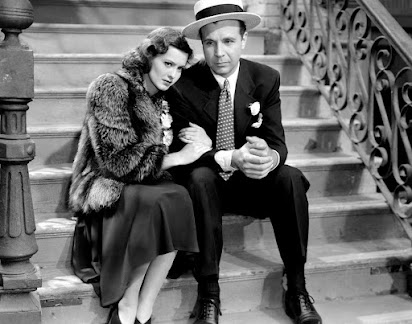Sullivan’s Travels (1942) is a satirical look at life in Hollywood as only director Preston Sturges could tell it. It centers around successful movie director John L. Sullivan (Joel McCrea) and his quest to learn more about life so he can film the deadly serious novel O Brother Where Art Thou?
Sullivan’s previous films were profitable comedies, but the director yearns for more. He wants to be taken seriously like Frank Capra.
To learn about life, Sullivan disguises himself as a hobo. Along the way, he meets a disillusioned young actress (Veronica Lake) who convinces him to take her on his quest. Together they experience many adventures where they discover that a bit of laughter goes a long way in tough times.
But then the movie world is suddenly turned upside down when Sullivan goes missing. Where is John L. Sullivan?
Sullivan’s Travels features the great Sturges stock company, featuring William Demarest, Robert Greig, Eric Blore, Esther Howard, and Franklin Pangborn.
 |
| Veronica Lake and Joel McCrea |
Preston Sturges (1898 - 1959) was an American playwright, screenwriter, and film director. Sturges was one of the first film directors to direct his screenplays, opening the door for Billy Wilder and Joseph L. Mankiewicz to do the same. Sturges was a successful playwright, Hollywood screenwriter, and script doctor. As a writer-director, Sturges had an amazing output of films in five years, all considered classics today. These films include The Great McGinty (1940), Christmas in July (1940), The Lady Eve (1941), Sullivan's Travels (1941), The Palm Beach Story (1942), Hail the Conquering Hero (1944), and The Miracle of Morgan's Creek (1944). After leaving Paramount Pictures in a dispute with upper management, Sturges's career declined and he never produced anything close to the quality of his earlier successes. Despite this decline, Sturges is considered one of the greatest talents to come out of Hollywood.
Joel McCrea (1905 – 1990) was an American movie star who appeared in over 100 films. During his almost-five-decades career, McCrea worked with some of the top directors in Hollywood including Alfred Hitchcock (Foreign Correspondent 1940), Preston Sturges (Sullivan’s Travels 1941, The Palm Beach Story 1942), and George Stevens (The More the Merrier 1943). McCrea worked opposite some of the top leading actresses of the day including Miriam Hopkins, Irene Dunne, Veronica Lake, Claudette Colbert, and Barbara Stanwyck with whom he made six films. He was the first actor to play Dr. Kildare in the film Internes Can’t Take Money (1937) costarring Stanwyck. McCrea married actress Frances Dee in 1933. The two were married until McCrea died in 1990.
Veronica Lake (1922 - 1973) was an American film, stage, and television actress. She was a popular star of film noirs, often paired with Alan Ladd in the 1940s. She was also famous for her peek-a-boo hairstyle. Her home studio, Paramount, dubbed her the peek-a-boo girl. Women and girls all over the world copied her hair-over-one-eye hairstyle. Lake became an overnight sensation with her role in I Wanted Wings (1940). During the height of her career, Lake was making $4,500 a week. Some of her popular films include Sullivan’s Travels (1941), This Gun for Hire (1942), The Glass Key (1942), So Proudly We Hail! (1943), and The Blue Dahlia (1946). Lake’s career declined due to her struggle with alcoholism. She died from cirrhosis of the liver in 1973. She was 50 years old.
Sullivan’s Travels trivia
- Veronica Lake was six months pregnant when she signed on for this film. Costume designer Edith Head designed a wardrobe to hide this fact. Production was from June 12 to July 22, 1941, and her daughter Elaine Detlie was born on August 21, 1941.
- Sturges wanted to use a clip from a Charlie Chaplin film in the church scene but Chaplin refused permission.
- Sturges wrote the film with Joel McCrea in mind. He never considered anyone else for the role.
- Anthony Mann was Preston Sturges’s assistant.
Discussion questions
- What did you make of Sturges’s critique of Hollywood? Do you think there was any truth in his satire?
- This was Veronica Lake’s first big starring role. Was she up to the task? Many studio heads didn’t think she was right for the role.
- The film is filled with great dialogue. Was there a line from the movie that was, particularly memorable or funny?
- Joel McCrea and Veronica Lake supposedly didn’t get along. Did that show in their performances?
- The film has many character actors that Sturges used in many of his movies. Do you have a favorite?






